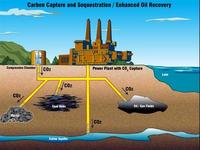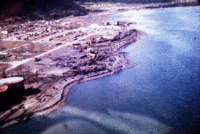-
Small, portable, fast TLC unit for explosives, drugs analysis
Field Forensics of St. Petersburg, Florida, unveiled its microTLC, a portable and easy to use solution for pre-screening and presumptive identification of drugs and explosive mixtures. Thin layer chromatography (TLC) is an established laboratory procedure which identifies compounds belonging to the same general chemical class. The microTLC makes it possible for both laboratory and field analysis to be performed by first responders and forensics scientists.
-
-
Carbon capture technology vital for meeting climate targets

In 2010, coal, oil, and gas supplied more than 80 percent of the world’s total primary energy supply — and the demand for energy is projected to increase by two to three times by 2100. Studies show that without policies to cut greenhouse gas emissions, fossil fuels will remain the major energy source in 2100, with resulting increases in greenhouse gas emissions. Where should policymakers focus their carbon mitigation efforts, however? Which technologies hold the most promise?Scientists say that a combination of carbon capture and storage (CCS) and bioenergy has advantages over solar, wind, and nuclear because it can lead to negative emissions. Moreover, bioenergy can be converted into liquid and gaseous fuels which are easily storable and can be readily used by current transportation systems,thus taking some pressure off other sector in terms of required mitigation effort.
-
-
World's shrinking groundwater sources in urgent need of better governance

Groundwater makes up 97 per cent of the world’s available fresh water. Total global use is estimated by scientists at around 1,000 cubic kilometers a year, with the largest users being India, China, and the United States. Since 1900, the world has drawn down its groundwater reserves by an estimated 4,500 cubic kilometers — and demand continues to increase, especially in arid countries, which are rapidly running short of water that can be affordably extracted. Scientist has urged the world to take better care of its groundwater resources — or risk dangerous scarcities, economic impacts, and potential conflicts in coming decades.
-
-
Dolphin-inspired innovative radar system to detect surveillance, explosive devices
Inspired by the way dolphins hunt by using bubble nets, scientistshave developed a new kind of radar that can detect hidden surveillance equipment and explosives.The twin inverted pulse radar (TWIPR) is able to distinguish true targets, such as certain types of electronic circuits that may be used in explosive or espionage devices, from clutter (other metallic items like pipes, drinks cans, nails for example) that may be mistaken for a genuine target by traditional radar and metal detectors.
-
-
Sun not a key cause of climate change

Climate change has not been strongly influenced by variations in heat from the sun, a new scientific study shows. The findings overturn a widely held scientific view that lengthy periods of warm and cold weather in the past might have been caused by periodic fluctuations in solar activity.
-
-
How effective are renewable energy subsidies? It depends
Renewable energy subsidies have led to explosive growth in wind power installations across the United States, especially in the Midwest and Texas. Electricity produced by wind is emission free, so the development of wind-power may reduce aggregate pollution by offsetting production from fossil fuel generated electricity production. Emission rates of fossil fuel generators, however, vary greatly by generator (coal-fired, natural gas, nuclear, hydropower). Thus, the quantity of emissions offset by wind power will depend crucially on which generators reduce their output. In other words, the quantity of pollutants offset by wind power depends crucially on which generators reduce production when wind power comes online.
-
-
Curbing climate change requires more attention to livestock
While climate change negotiators struggle to agree on ways to reduce carbon dioxide (CO2) emissions, they have paid inadequate attention to other greenhouse gases associated with livestock. Researchers say that cutting releases of methane and nitrous oxide, two gases that pound-for-pound trap more heat than does CO2, should be considered alongside the challenge of reducing fossil fuel use. Ruminant livestock (cattle, sheep, goats, and buffalo) produce copious amounts of methane in their digestive systems. CO2 is the most abundant greenhouse gas, but the international community could achieve a more rapid reduction in the causes of global warming by lowering methane emissions through a reduction in the number of ruminants, the researchers say, than by cutting CO2 alone.
-
-
Natural gas saves water, reduces drought vulnerability
A new study finds that in Texas, the U.S. state that annually generates the most electricity, the transition from coal to natural gas for electricity generation is saving water and making the state less vulnerable to drought. Even though exploration for natural gas through hydraulic fracturing requires significant water consumption in Texas, the new consumption is easily offset by the overall water efficiencies of shifting electricity generation from coal to natural gas. The researchers estimate that water saved by shifting a power plant from coal to natural gas is 25 to 50 times as great as the amount of water used in hydraulic fracturing to extract the natural gas.
-
-
One step closer to nuclear fusion power station
Researchers have made a technological breakthrough crucial to the success of nuclear fusion reactors, allowing for clean, inexhaustible energy generation based on the workings of the stars in our galaxy. At the heart of the new development is an ingenious and robust superconducting cable system. This makes for a remarkably strong magnetic field that controls the very hot, energy-generating plasma in the reactor core, laying the foundation for nuclear fusion. The new cables are far less susceptible to heating due to a clever way of interweaving, which allows for a significant increase in the possibilities to control the plasma.
-
-
Freshwater loss compounds climate change’s detrimental effects on agriculture
A warmer world is expected to have severe consequences for global agriculture and food supply, reducing yields of major crops even as population and demand increases.Agricultural models estimate that given the present trajectory of greenhouse gas emissions, climate change will directly reduce food production from maize, soybeans, wheat, and rice by as much as 43 percent by the end of the twenty-first century. Now, a new analysis combining climate, agricultural, and hydrological models finds that shortages of freshwater used for irrigation could double the detrimental effects of climate change on agriculturedue to the reversion of twenty to sixty million hectares of currently irrigated fields back to rain-fed crops.
-
-
Sea level rise, shoreline changes leading influences on flooding from hurricanes
Recent studies into coastal flooding have focused on climate change impacts on the intensity and frequency of tropical cyclones themselves, but researchers say that two other factors contribute even more to the growing threats to coastal communities: sea level rise and shoreline retreat. Researchers highlight sea level rise and its potential dramatically to change the coastal landscape through shoreline erosion and barrier island degradation, and say that it is an under-appreciated and understudied factor that could lead to catastrophic changes in flood risk associated with tropical cyclones, known as hurricanes in the North Atlantic.
-
-
Asteroid hunter spacecraft returns first images after reactivation
In 2010 and early 2011, NASA’s Near-Earth Object Wide-field Infrared Survey Explorer (NEOWISE), a spacecraft that made the most comprehensive survey to date of asteroids and comets, discovered more than 34,000 asteroids and characterized 158,000 throughout the solar system. It was reactivated in September following thirty-one months in hibernation, to assist NASA’s efforts to identify the population of potentially hazardous near-Earth objects (NEOs).
-
-
Sandia to show Mine Rescue Robot at 2013 DARPA Robotics Challenge
Engineers from Sandia National Laboratories will demonstrate real-world robotics successes at the DARPA Robotics Challenge Trials 2013 Expo this week (20-21 December) in Florida. The challenge is focused on human-scaled robots that assist in humanitarian aid and disaster response. Sandia engineers will demonstrate the Gemini Scout Mine Rescue Robot, which was designed to overcome dangers lurking in a mining accident: poisonous gases, flooded tunnels, explosive vapors, and unstable walls and roofs. Such potentially deadly conditions and unknown obstacles can slow rescue efforts to a frustrating pace.
-
-
Exploring geoengineering research, ethics, governance
Hacking the Earth’s climate to counteract global warming — a subject that elicits strong reactions from both sides — is the topic of a December special issue of the journal Climatic Change. A dozen research papers include the most detailed description yet of the proposed Oxford Principles to govern geoengineering research, as well as surveys on the technical hurdles, ethics, and regulatory issues related to deliberately manipulating the planet’s climate.
-
-
Japan tsunami exacerbated by landslide

The 2011 Japan tsunami, which killed up to 20,000 people and caused the partial meltdown of the Fukushima nuclear plant, was made worse by an underwater landslide, according to scientists. “The earthquake alone cannot explain the height of the waves along the Sanriku coast of northern Honshu Island,” says one scientist. “They were generated by a submarine landslide.” The research poses a big problem for early-warning systems, because where the risk of landslides goes unrecognized, tsunamis generated by similar earthquakes could be seriously underestimated.
-
More headlines
The long view
New Technology is Keeping the Skies Safe
DHS S&T Baggage, Cargo, and People Screening (BCP) Program develops state-of-the-art screening solutions to help secure airspace, communities, and borders
Factories First: Winning the Drone War Before It Starts
Wars are won by factories before they are won on the battlefield,Martin C. Feldmann writes, noting that the United States lacks the manufacturing depth for the coming drone age. Rectifying this situation “will take far more than procurement tweaks,” Feldmann writes. “It demands a national-level, wartime-scale industrial mobilization.”
How Artificial General Intelligence Could Affect the Rise and Fall of Nations
Visions for potential AGI futures: A new report from RAND aims to stimulate thinking among policymakers about possible impacts of the development of artificial general intelligence (AGI) on geopolitics and the world order.
Smaller Nuclear Reactors Spark Renewed Interest in a Once-Shunned Energy Source
In the past two years, half the states have taken action to promote nuclear power, from creating nuclear task forces to integrating nuclear into long-term energy plans.
Keeping the Lights on with Nuclear Waste: Radiochemistry Transforms Nuclear Waste into Strategic Materials
How UNLV radiochemistry is pioneering the future of energy in the Southwest by salvaging strategic materials from nuclear dumps –and making it safe.
Model Predicts Long-Term Effects of Nuclear Waste on Underground Disposal Systems
The simulations matched results from an underground lab experiment in Switzerland, suggesting modeling could be used to validate the safety of nuclear disposal sites.
